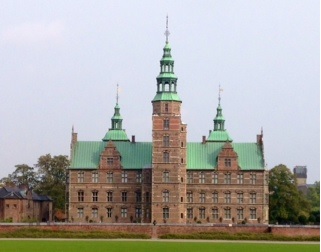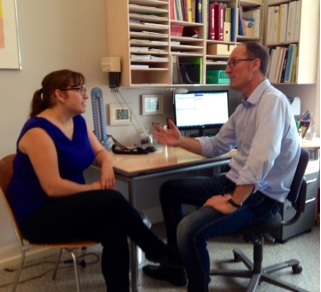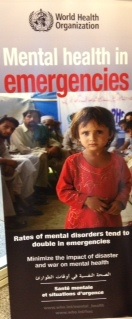From the President: Something wonderful in the state of Denmark
 Photo: Typical green spires of Copenhagen
español
Photo: Typical green spires of Copenhagen
español
Dr Thomas Drivsholm is a Danish family doctor working in Copenhagen. Thomas has a list of patients who rely on him for their medical care and advice.
Denmark is a country with an enviable system of health care, based on strong family medicine and providing universal health coverage. I was invited to visit Denmark to speak at the annual meeting of the Danish College of General Practitioners (DSAM) and I was keen to learn more about the successes and also the challenges facing Danish general practice.
The Danish population of 5.5 million people is served by 3,600 general practitioners. All citizens are covered by the national insurance scheme and have free access to general practice services, regardless of their ability to pay. While general practices are privately owned businesses, health care is entirely publicly funded. Each general practitioner has a list of patients and serves as a gatekeeper to specialist medical services and many allied health services. Each fulltime GP provides care to an average of 1600 people. Government funding is 25% capitation and 75% fee for service. Danish GPs provide over 36,000,000 consultations each year, an average of seven consultations for each citizen.
 Photo: Danish family doctor, Dr Thomas Drivsholm, at work in his clinic (with role-playing patient)
Photo: Danish family doctor, Dr Thomas Drivsholm, at work in his clinic (with role-playing patient)
Danish general practice is also a world leader in the use of health care technology and has embraced electronic medical records, using WONCA’s classification system, ICPC (International Classification of Primary Care), to code diagnoses. ICPC allows Danish GPs to analyse the content of their medical record systems to their own activity and to better understand the health needs of their patient population. Data from Danish general practices is transferred automatically from the electronic medical record systems to the Danish General Practice Database allowing primary care researchers in Denmark to investigate the health status of the whole community, analyse the quality of care being delivered, provide feedback to each GP about their own patient population, and make national recommendations for continuing improvements to health care delivery.
Photo: Danish family doctor, Dr Thomas Drivsholm, at work in his clinic (with role-playing patient)
Yet Danish general practice faces challenges, including ensuring the provision of care to people living in the more sparsely populated areas of Denmark and the remote autonomous territories of Greenland and the Faroe Islands. As the population ages, Danish GPs, in common with colleagues in many other countries, are being asked to do more chronic disease management and preventive care activities without additional resourcing and support. One-third of Danish GPs work in solo practices, often in rooms within old apartment buildings, with little opportunity for merger or expansion. While many general practices employ nurses, this is not yet universal. And the Danish GP workforce is ageing, with an average age of 54 years.
Fortunately there is strong enthusiasm for general practice among many recent medical graduates and medical students in the nation’s four medical schools. General practice specialty training is for six years following graduation from medical school, the same as for other medical specialties. And general practice research in Denmark is very strong, as is the case in many of the countries of Northern Europe, and makes a major contribution to the global primary care evidence base.
I was very impressed with the work of the WONCA’s member organization in Denmark, the Danish College of General Practitioners, and the commitment of the college to education, research and quality care. And, as is so common around the world, the energy and enthusiasm of young GPs in Denmark was infectious. WONCA members will have the opportunity to experience Danish general practice when the Nordic member of WONCA host the WONCA Europe conference in Copenhagen in June 2016.
Before heading to Denmark, I spent three days in Cairo in Egypt at a meeting of the Eastern Mediterranean Region Office of the World Health Organization (WHO). I was joined in Cairo by members of the WONCA working party in mental health, Dr Gabrial Ivbijaro and Dr Abdullah Al-Khathami.
The WHO is working with the nations of the Eastern Mediterranean region to strengthen mental health care and WONCA is supporting the WHO on ways to better integrate mental health into primary care and improving the training of all health care workers in mental health.
The Eastern Mediterranean Region covers nations from Morocco to Somalia in Northern Africa, and from Lebanon to Pakistan in the Middle East and South Asia. It includes many nations where people are experiencing serious armed conflict and war, including Libya, Syria, Iraq and Afghanistan, and nations with large numbers of refugees including Jordan. It was sobering to hear representatives of nations speaking about the impact of these serious conflicts on the health and well being of their population and especially the impact on the mental health of children experiencing the horrors of war.
Photo: World Health Organization campaign to raise awareness of the devastating effects of disasters and wars on the mental health of the people of affected populations

WONCA is working closely with the WHO on a number of global mental health initiatives to assist people affected by disasters and war. I recommend the following WHO resources to you:
Preventing Suicide – a global imperative
This report, released in September by the WHO, provides details of suicide statistics for all nations and recommendations that nations can implement to support suicide prevention.
Building Back Better – sustainable mental health care after emergencies
This is a wonderful report on how creating sustainable mental health systems must be part of any long-term recovery in the aftermath of emergencies, including natural disasters, armed conflicts and civil wars, and technological failures, such as nuclear disasters. It outlines how emergencies can provide the opportunity to build better mental health care, and includes valuable insights on programs in Afghanistan, Burundi, Iraq, Jordan, Kosovo, Somalia, Sri Lanka, West Bank and Gaza Strip, Indonesia (Aceh) and Timor-Leste.
Mental Health Action Plan 2013-2020
This is the WHO's global plan, endorsed by all member nations, and outlining strategies and targets to improve mental health care provision to the people of the world.
Integrating mental health into primary health care
This is an important joint publication from WONCA and WHO. It was released in 2008 and continues to form the basis for the global work WONCA is doing strengthening the delivery of mental health services through family medicine around the world.
Finally I want to again highlight the continuing ebola crisis in nations in West Africa. While it provides some hope to see recent activity by some world leaders to assist local health care workers in tackling this serious health crisis, the situation is still extreme. I urge you to provide financial support, through agencies like Médecins Sans Frontières (Doctors Without Borders) and the International Red Cross/Red Crescent, to support our colleagues working with these organizations in their work on the ground assisting our colleagues in West Africa. And I urge you to advocate to your own government to increase aid and support. The epidemic continues to spread, taking the lives of many people, including many of our colleagues in West Africa, who have had inadequate access to protective equipment and life-saving treatments, and who have died while providing care to the people of their local communities.
Michael Kidd
President
World Organization of Family Doctors (WONCA)